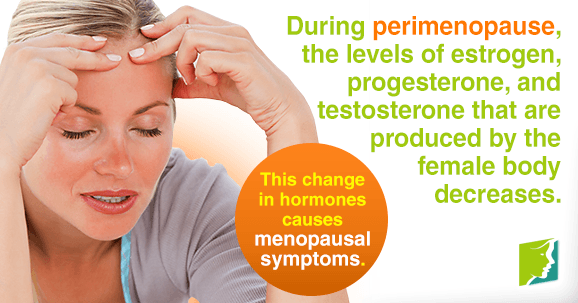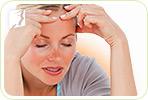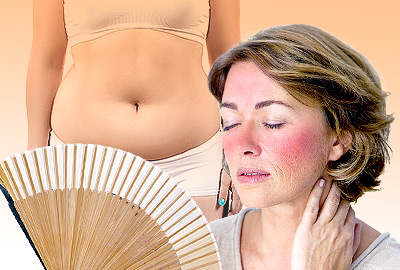Menopause signals the end of a woman's monthly menstrual cycle, and this is caused by a decline in the levels of sex hormones, mainly estrogen and progesterone. These hormonal changes can cause menopausal symptoms like hot flashes, vaginal dryness, and mood swings.
What Happens to My Hormones?
Menopause defines the moment in a woman's life when she has not had a menstrual period for one year. The phase leading up to this time, known as perimenopause, is when most menopausal symptoms appear. The amount of time a woman is in perimenopause varies. Leading up to menopause, a woman's ovaries have fewer eggs and her menstrual cycle can become irregular.
Estrogen and progesterone play important roles in the menstrual cycle and in reproduction; however, when the transition from reproductive to non-reproductive happens, these hormones aren't produced in as large of quantities. Production of estrogen and progesterone in the ovaries eventually stops altogether. As their levels decrease, the body needs time to adjust to the changes. This explains many of the menopausal symptoms women experience.
Do Hormonal Changes Cause Menopausal Symptoms?
Yes. Estrogen plays a role in body temperature regulation, which helps to explain why hot flashes and night sweats occur. Declining estrogen can explain changes in skin and hair. Changing hormone levels also cause mood swings and other emotional changes. The impact estrogen and progesterone have on the body is widespread, and research continues to be done to better understand the roles these hormones play.
What Can I Do to Ease Menopausal Symptoms?
Many women naturally adjust to the decline in hormone levels. However, most women experience some menopausal symptoms, and women should not have to wait until postmenopause for their symptoms to dissipate. Some common menopausal treatments include:
- Eating healthy, exercising regularly, and staying hydrated
- Taking time to de-stress (e.g., yoga, running, kickboxing)
- Avoiding excessive amounts of caffeine and alcohol
- Getting enough vitamin B, C, D, and E
- Getting enough sleep
- Talking to your doctor about hormone replacement therapy
- Using vaginal lubricant or moisturizer to combat vaginal dryness
Of course, there are different treatments depending on what your menopausal symptoms are. It can be helpful to join a menopausal support group, online forum or talk to other women who have or are experiencing menopause. This can help you feel connected and other woman will know first-hand what treatments for menopause symptoms tend to work the best.
Recommendation
Menopause is not a disease, so it does not need to be diagnosed by a doctor, and many women progress through menopause with few to no symptoms. Many women embrace the menopausal transition because it frees them from their menstrual cycle and it can be empowering to begin a new stage of life.
However, if your menopausal symptoms are lowering the quality of your life or preventing you from doing things that you enjoy, it's important that you talk to your doctor. You should not have to suffer through menopause symptoms and helpful treatments are available.
Sources
- The North American Menopause Society. (2010). Changes in Hormone Levels. Retrieved from http://www.menopause.org/for-women/sexual-health-menopause-online/changes-at-midlife/changes-in-hormone-levels
- John Hopkins University. (n.d).Introduction to Menopause. Retrieved from: http://www.hopkinsmedicine.org/healthlibrary/conditions/gynecological_health/introduction_to_menopause_85,P01535/




